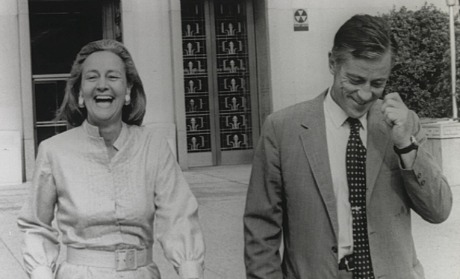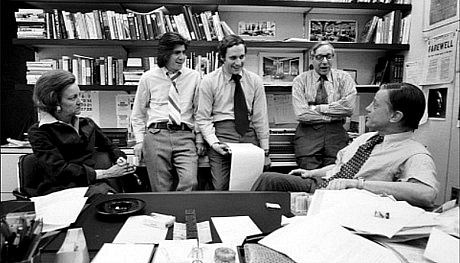Last night I read a recent draft of Liz Hannah‘s script for The Post, the forthcoming 20th Century Fox film about the Pentagon Papers crisis of 1971. It’s a good script, but my initial dream that it might be some kind of definitive Pentagon Papers saga or a tense newsroom thriller along the lines of Spotlight or All The President’s Men turned out to be…uhm, just that.
The Post, which will topline Meryl Streep and Tom Hanks, will begin filming in May under director Steven Spielberg and be released in December. It’s about how Washington Post publisher Katherine Graham (Streep), who initially saw herself as less than ideally suited to the task and was little more than a blandly embedded figure in Washington social circles, gradually grew some courage and a sense of journalistic purpose during the Pentagon Papers episode, which transpired over a 17-day period in June 1971.

Washington Post publisher Katherine Graham, exec editor Ben Bradlee in the early ’70s.
Hannah’s script is about a testy, at times caustic relationship between Graham and exec editor Ben Bradlee (Tom Hanks) when the N.Y. Times published Neil Sheehan‘s report about Daniel Ellsberg‘s Pentagon Papers documents (which proved that the stated motives and justifications for the Vietnam War were dishonest and deceptive) and the Post debated whether to publish a trove of similar docs, also from Ellsberg, and stand up to the Nixon administration’s legal challenges and threats.
The Post is basically a middle-aged woman’s self-empowerment saga. The project was hatched and nurtured along by producer Amy Pascal.
I wrote the following to a critic friend this morning: “I had no idea Mrs. Graham was so mushy-minded, such a slow-boater, so reluctant to accept the responsibility of first-rate, big-city journalism…even after the N.Y. Times had published the Pentagon Papers, the Washington Post (not Bradlee but Graham, the lawyers and others) was still hesitating, still unsure about whether to publish more of the same…the draft I read is 118 pages and for over 70 pages my constant thought was ‘when is Mrs. Graham going to wake up and man up?’
“She finally does, of course, but it takes her long enough. And poor, exasperated Bradlee trying to goad her along…he’s never less than scrappy and tough but I felt for the poor guy.”
The following two passages from Graham’s Wikipage sums up what The Post is basically about:
Graham’s candidly written “Personal History,” published in 1998, states that (a) “As the only woman to be in such a high position at a publishing company, [Mrs. Graham] had no female role models and had difficulty being taken seriously by many of her male colleagues and employees”, but that (b) “The convergence of the women’s movement with Graham’s ascension to power at the Post brought about changes in Graham’s attitude and also led her to promote gender equality within her company.”
The Post is a well-written, reasonably compelling story as far as it goes, but by focusing on Graham’s personal tale rather than the meat and marrow of the Pentagon Papers saga it half-sidesteps what could have been a fascinating, gripping procedural-slash-thriller about one of the toughest and proudest episodes in big-time American journalism.
It portrays a pivotal moment not just for Graham but the Washington Post, which prior to the Pentagon Papers episode had been regarded as a relatively rote and lackluster newspaper compared to the N.Y. Times, but Spotlight, it ain’t. And it damn sure isn’t All The President’s Men.
It’s a story about a wealthy, privileged, bordering-on-timid woman with self-esteem issues who gradually decides to inch her way into growing a journalistic backbone.
It’s nicely written with good story structure — the existence and content of the Pentagon Papers aren’t revealed until page 33 or so, and Graham doesn’t really find her inner steel until the last third — but what does this have to do with 2017 other than providing a reminder that we need good, tough journalism in the age of Trump?
I’m wondering to what degree average moviegoers will relate to a story of a woman born into wealth and power in 1917, who married in 1940 and lived for many years in the shadow of her husband (Phil Graham, who served as Post publisher from 1946 until his suicide in ’63) and was in her mid 50s when American feminism was beginning to be heard and felt in the early ’70s, etc. The context is arcane and dated, to say the least.
Yes, Streep will probably be Best Actress nominated but what else is new? I could easily see Hanks landing one also, although he’ll have to overcome fond memories of Jason Robards‘ Bradlee performance in All The President’s Men.

(l. to. r) Graham, Carl Bernstein, Bob Woodward, Post editor Howard Simons, Bradlee.












